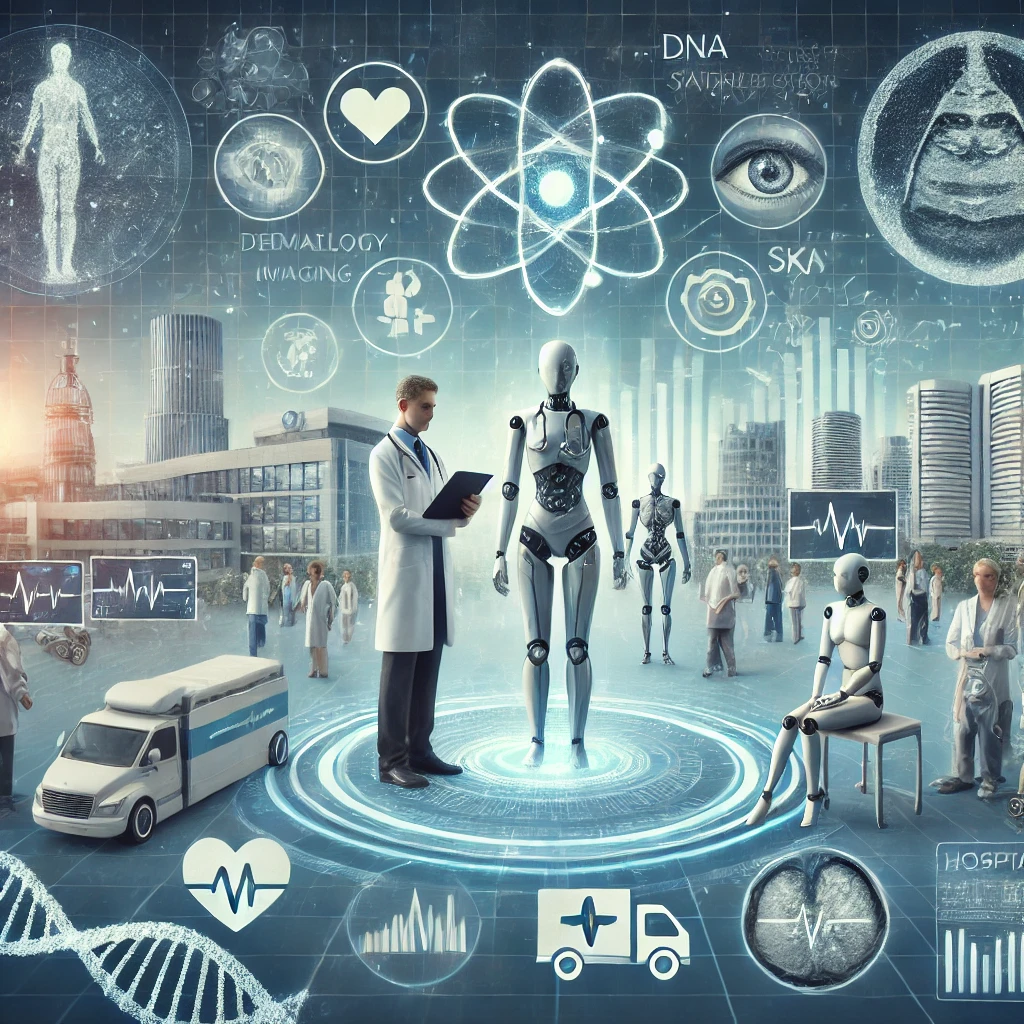Since the 1980s (and even earlier), the idea of using computers to support medical diagnosis has been discussed. In fact, expert systems like MYCIN (from the 1970s) were pioneers in trying to simulate physicians’ reasoning for diagnosing bacterial infections. However, there were significant limitations:
Why It Took So Long to Materialize in Practice:
- Complexity of Medical Knowledge
- Computational Limitations
- Lack of Digital Data
- Immaturity of Artificial Intelligence
The Turning Point with Modern AI
Only with the convergence of three key factors did medical AI begin to gain real traction:
- Large-scale structured data (e.g., lab tests, medical records, genomics)
- Advanced computing infrastructure, such as GPUs and cloud computing
- Advances in AI models, including deep neural networks and transformer architectures
Current Applications of AI in Healthcare
1. Radiology and Medical Imaging
Tools like Aidoc, Zebra Medical, and Google DeepMind assist in detecting strokes, fractures, lung nodules, and cancers (e.g., breast, prostate) in CT scans, MRIs, and X-rays.
AI acts as a “second pair of eyes,” speeding up diagnosis and reducing human error.
2. Dermatology
Apps like SkinVision or validated algorithms from Stanford University detect suspicious melanoma lesions with accuracy comparable to experienced dermatologists.
3. Ophthalmology
The IDx-DR system (FDA-approved) diagnoses diabetic retinopathy based on retinal images, without requiring human interpretation.
It is widely used in public health systems and clinics in the U.S. and India.
4. Digital Pathology
AI applied to digital biopsy slides to identify lymph node metastases, tumors, and genetic markers.
Solutions like PathAI and Paige.AI are already in clinical and commercial use.
5. Electronic Health Records and Decision Support
Models such as the now-discontinued IBM Watson Health — which paved the way — and today’s Large Language Models (LLMs) like Google Med-PaLM 2 and GPT-4o, trained with medical data.
They can answer clinical questions, summarize cases, and support medical decision-making.
6. Hospital Flow and Operations
AI for discharge prediction, bed allocation, patient triage (e.g., TriageGPT), and internal transportation management based on real-time and historical data.
The Future Landscape of AI in Healthcare
1. Personalized Medicine and Genomics
AI analyzing millions of genetic, environmental, and lifestyle data points to recommend personalized treatments.
Examples include AI-powered immunotherapy and precision medicine for cancer and rare diseases.
2. Medical Conversational Agents (Med-GPTs)
Autonomous medical assistants (with human supervision) for telemedicine, patient education, automated triage, and chronic disease management.
Already being tested with Med-Gemini (Google), which outperforms physicians on some standardized tests.
3. AI-Integrated Robotics
Surgical robots with real-time AI assistance (not to perform surgeries independently, but to guide, adjust, and predict risks).
Example: Da Vinci robot + AI for automated learning and support.
4. Paperless Hospitals with Embedded AI
Smart EHR systems, AI in hospital regulation centers, and automated processes (from hospital nutrition to bed cleaning).
AI will stop being an “add-on module” and become a core part of hospital operations.
5. AI as a Regulated Second Opinion
Regulatory bodies like the FDA, EMA, and others are developing frameworks to allow AI to issue reports, order tests, and act as a “clinical co-responsible” — provided there is ethical and auditable governance in place.
Challenges and Ethical Considerations
- Data privacy (LGPD, HIPAA)
- Algorithmic bias: AI models trained on skewed data may systematically underperform for specific populations
- Legal responsibility: Who is liable for AI errors?
- System interoperability and cultural resistance to adoption
Conclusion
Although imagined for decades, the effective application of artificial intelligence in medicine only became a reality thanks to the simultaneous advancement of computational infrastructure, large-scale data digitization, and model maturity. Today, AI is already a powerful ally in medical imaging, triage, clinical decision support, and hospital management — and its impact is being felt in patient safety, operational efficiency, and healthcare equity.
The future points to an increasingly intelligent, personalized, and integrated healthcare ecosystem, where doctors and algorithms work in complementary roles. However, ethical, regulatory, and cultural challenges remain, requiring careful attention to ensure that technological advancement does not come at the expense of trust, privacy, or fairness.
Ultimately, artificial intelligence is not here to replace the human element in care — but to enhance, support, and empower it, as long as it is guided by purpose, responsibility, and governance.
Reach a global audience of portfolio, program, and project managers, product leaders, and certification professionals. Explore advertising opportunities .
Sponsored

